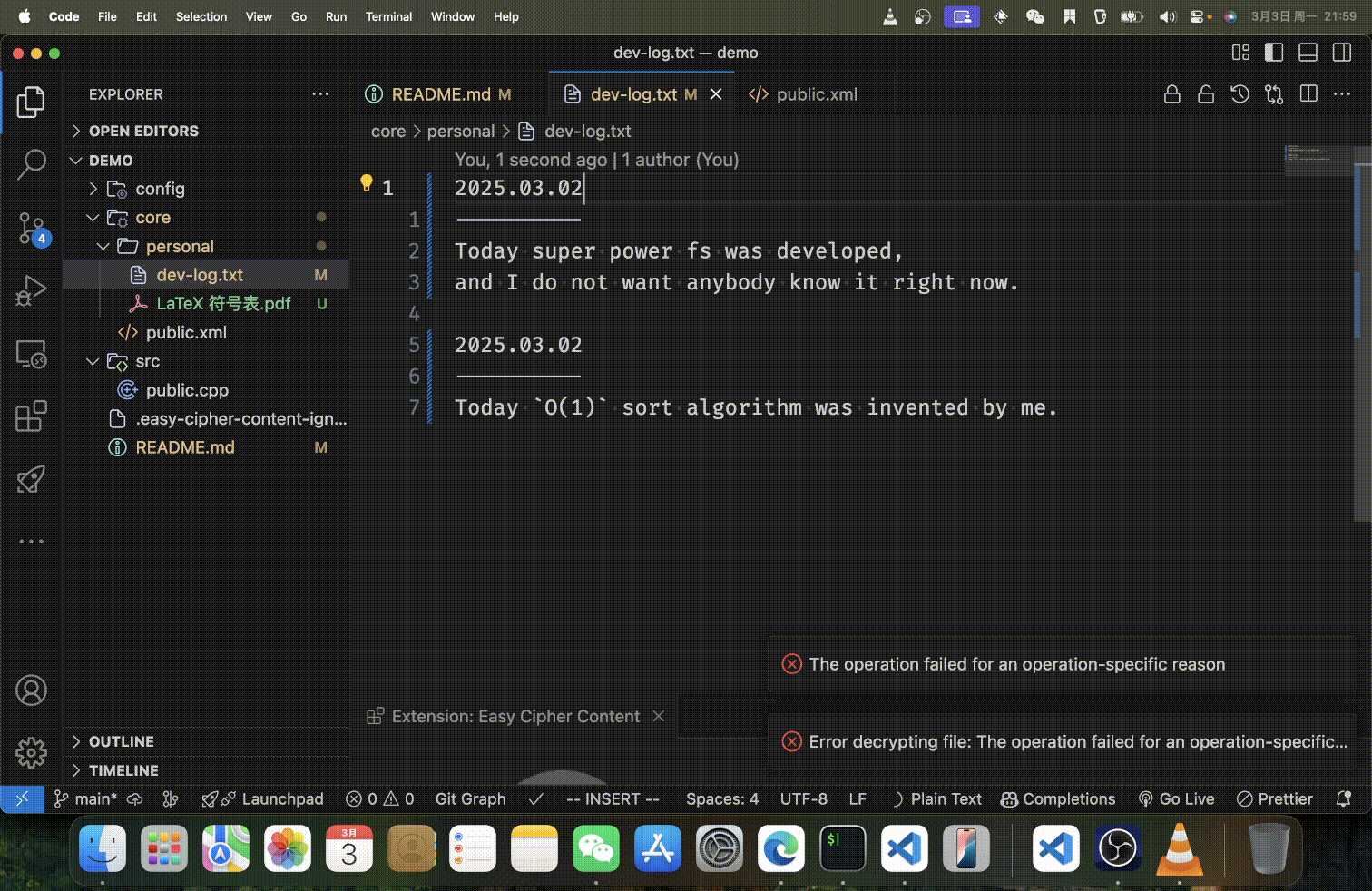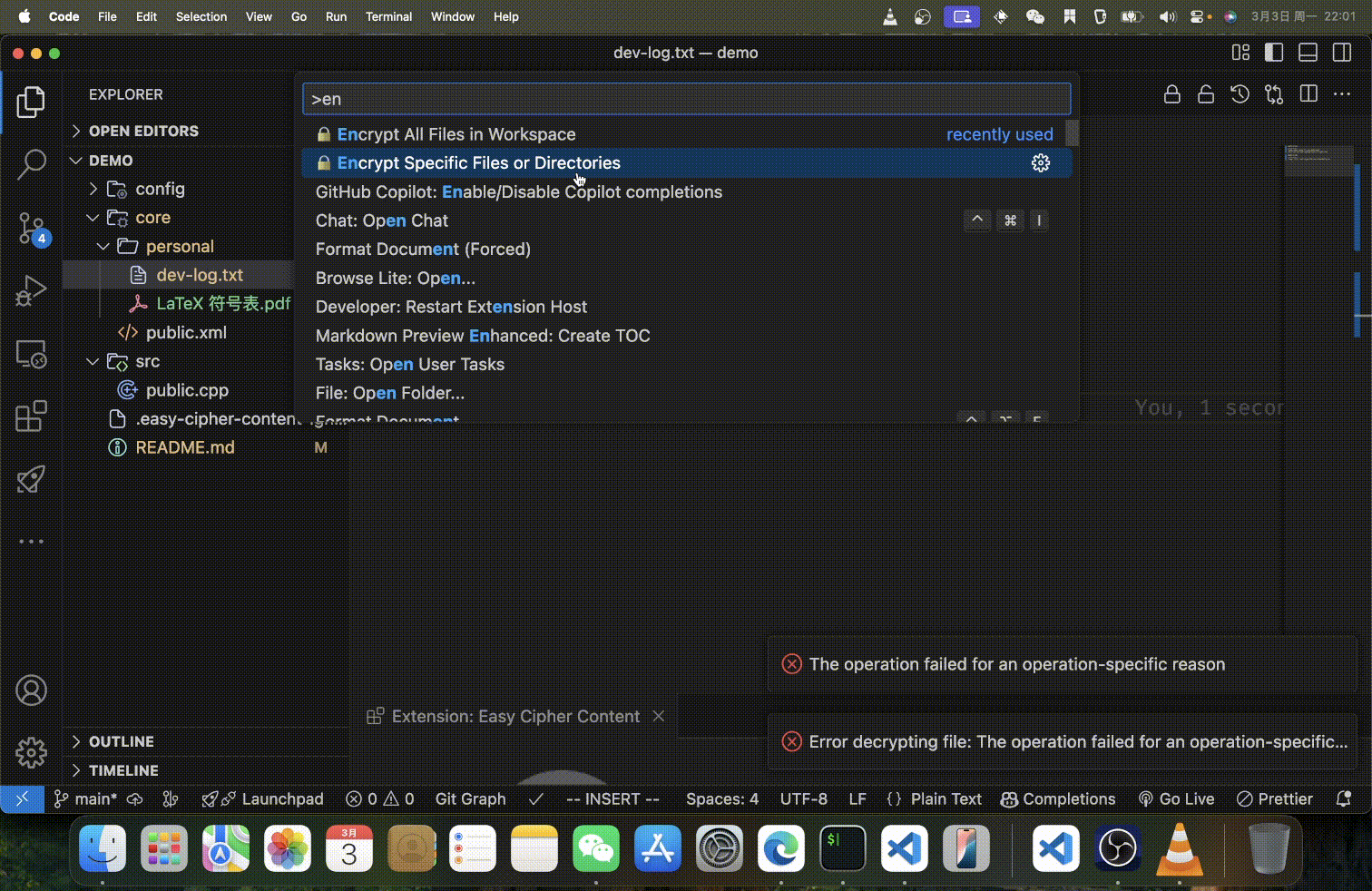Easy Cipher Content
A powerful VS Code extension for securing both text and binary files with industry-standard encryption algorithms. Easily protect your sensitive data while maintaining a seamless workflow in your development environment.

Features
- 🔒 Encrypt and 🔓 Decrypt content with a single click
- 🔄 Support for both text files (line-by-line encryption) and binary files (complete file encryption)
- 🗄️ Batch operations for entire workspaces or specific directories
- 📂 Smart path suggestions and file browser integration
- 🚫 Configurable ignore patterns for excluding files from batch operations
- 🔐 Enterprise-grade encryption algorithms: AES-GCM and ChaCha20-Poly1305
- 🛠️ Flexible key management via environment variables or JSON configuration
- 🔑 Enhanced Security: Automatic salt and IV/nonce generation for maximum security
- 🔀 Git-Diff-Aware Encryption: Only re-encrypt lines that have changed according to git diff, preserving git history
Getting Started
Installation
- Open VS Code
- Go to Extensions (Ctrl+Shift+X / Cmd+Shift+X)
- Search for "Easy Cipher Content"
- Click Install
Setup
Configure your encryption keys using one of these methods:
Environment Variables (Recommended for security)
# For AES-GCM
export VSCODE_EXT_ECC_AESGCM_PASSWORD="your-secure-password"
# For ChaCha20-Poly1305
export VSCODE_EXT_ECC_CHACHA20POLY1305_PASSWORD="your-secure-password"
JSON Configuration
Create a JSON file with your encryption keys and set the path in the extension settings:
{
"password": "your-secure-password",
"textEncoding": "utf-8"
}
🔒 Security Enhancement: Starting with easy-cipher-mate@2.0.0, salt and IV/nonce values are automatically generated for each encryption operation, ensuring maximum security without manual configuration.
Usage
Single File Operations
- Open a file in the editor
- Click the 🔒 Encrypt or 🔓 Decrypt button in the editor title bar
- For text files, content is encrypted line-by-line, preserving the file structure
- For binary files, a new encrypted file is created with the
.enc extension
Workspace Operations
Encrypt or decrypt multiple files in your workspace:
- Open the Command Palette (
Ctrl+Shift+P / Cmd+Shift+P)
- Type and select one of the following:
Easy Cipher Content: 🔒 Encrypt All Files in WorkspaceEasy Cipher Content: 🔓 Decrypt All Files in WorkspaceEasy Cipher Content: 🔒 Encrypt Specific Files or DirectoriesEasy Cipher Content: 🔓 Decrypt Specific Files or Directories
Path Selection
When choosing specific files or directories to process, you have three convenient options:
- Quick Selection: Choose from smart suggestions of common directories and files
- Custom Path: Enter a custom path relative to your workspace or an absolute path
- File Browser: Use the integrated file picker to visually select files or folders

Ignoring Files and Directories
Create a .easy-cipher-content-ignore file in your workspace root with patterns similar to .gitignore:
# Example ignore patterns
node_modules/
*.log
.git/
dist/
Extension Settings
This extension provides the following settings:
easy-cipher-content.algorithm: Choose encryption algorithm ("aes-gcm" or "chacha20-poly1305")easy-cipher-content.use_env: Whether to use environment variables for encryption keyseasy-cipher-content.json_path: Path to JSON file containing encryption keys (if not using env vars)easy-cipher-content.textFileExtensions: Array of file extensions to be treated as text fileseasy-cipher-content.ignoreFile: Name of the file containing ignore patternseasy-cipher-content.deleteOriginalAfterEncryption: Whether to delete original files after encryptioneasy-cipher-content.enableGitDiffAwareEncryption: Enable git-diff-aware encryption for text files (default: true)
Security Best Practices
- Never commit encryption keys or encrypted sensitive data to public repositories
- Use environment variables rather than JSON files for key management when possible
- Set up a secure method for sharing encryption keys with team members
- Consider using different keys for different projects or types of sensitive data
- Automatic Security: The extension automatically generates unique salt and IV/nonce values for each encryption operation, ensuring maximum security
Technical Details
Enhanced Security Features
- Automatic Salt Generation: Each encryption operation uses a randomly generated 16-byte salt
- Automatic IV/Nonce Generation:
- AES-GCM: 12-byte random IV per operation
- ChaCha20-Poly1305: 12-byte random nonce per operation
- PBKDF2 Key Derivation: Uses 100,000 iterations for secure key derivation
- Authenticated Encryption: Built-in integrity protection prevents tampering
Text File Encryption
Text files are processed line by line, with each non-empty line encrypted individually. This approach:
- Preserves file structure and line breaks
- Makes diff tools still useful for encrypted files
- Allows partial decryption if only certain lines need to be accessible
- Each line gets its own unique salt and IV/nonce for maximum security
Git-Diff-Aware Encryption (New in v2.1.0)
When enableGitDiffAwareEncryption is enabled (default), the extension intelligently handles text file encryption by only re-encrypting lines that have changed according to git diff. This feature:
- Preserves Git History: Unchanged encrypted lines remain identical, making git diff meaningful even for encrypted files
- Optimizes Performance: Only modified lines are re-encrypted, speeding up the encryption process
- Maintains Security: Each re-encrypted line still gets unique salt and IV/nonce values
How It Works
- Git Repository Detection: Automatically detects if the file is in a git repository
- Change Analysis: Uses
git diff to identify which lines have been modified
- Selective Encryption:
- Changed lines: Re-encrypted with new salt/IV values
- Unchanged lines: Preserved from the previous encrypted version
- New files: All lines are encrypted (fallback behavior)
- Non-git projects: All lines are encrypted (fallback behavior)
Example Workflow
# Initial state: encrypted file in git
git status # clean
# User decrypts, modifies line 14-15, then re-encrypts
# Result: Only lines 14-15 are different in git diff
git diff main.go
# Shows only the actual changed encrypted lines, not the entire file
Edge Cases Handled
- New files: All lines are encrypted when file is not tracked by git
- Non-git repositories: Falls back to traditional full-file encryption
- Missing original content: Falls back to encrypting all lines
- Git command failures: Gracefully falls back to traditional encryption
Binary File Encryption
Binary files are encrypted as complete units, resulting in a new file with the .enc extension.
Migration from Previous Versions
If you're upgrading from a previous version that required manual salt/IV configuration:
- Remove old environment variables: You no longer need to set salt, IV, or nonce values
- Update JSON configuration: Remove salt, IV, and nonce fields from your JSON config files
- Re-encrypt existing files: Files encrypted with the old version will need to be decrypted with the old configuration and re-encrypted with the new version for enhanced security
Known Issues
- Very large binary files may cause performance issues during encryption/decryption
- Some special encodings might not be preserved perfectly in text mode encryption
- The extension cannot automatically detect binary vs text files outside the configured extensions
Troubleshooting
Issue: Decryption fails with "Invalid password" error
Solution: Verify that you're using the same encryption key that was used for encryption
Issue: Binary files are being treated as text files
Solution: Add the file extension to the textFileExtensions setting if it should be treated as text, or remove it if it should be treated as binary
Issue: Files encrypted with older versions cannot be decrypted
Solution: Use the previous version of the extension to decrypt, then re-encrypt with the new version for enhanced security
Contributing
Contributions are welcome! Please feel free to submit a Pull Request.
- Fork the repository
- Create your feature branch (
git checkout -b feature/amazing-feature)
- Commit your changes (
git commit -m 'Add some amazing feature')
- Push to the branch (
git push origin feature/amazing-feature)
- Open a Pull Request
License
Distributed under the MIT License. See LICENSE for more information.
Acknowledgments
- Built with easy-cipher-mate encryption library v2.0.0+
- Inspired by the need for simple but secure content protection in VS Code
Privacy Notice: This extension performs all encryption and decryption locally on your machine. Your encryption keys and content are never transmitted to any server.



